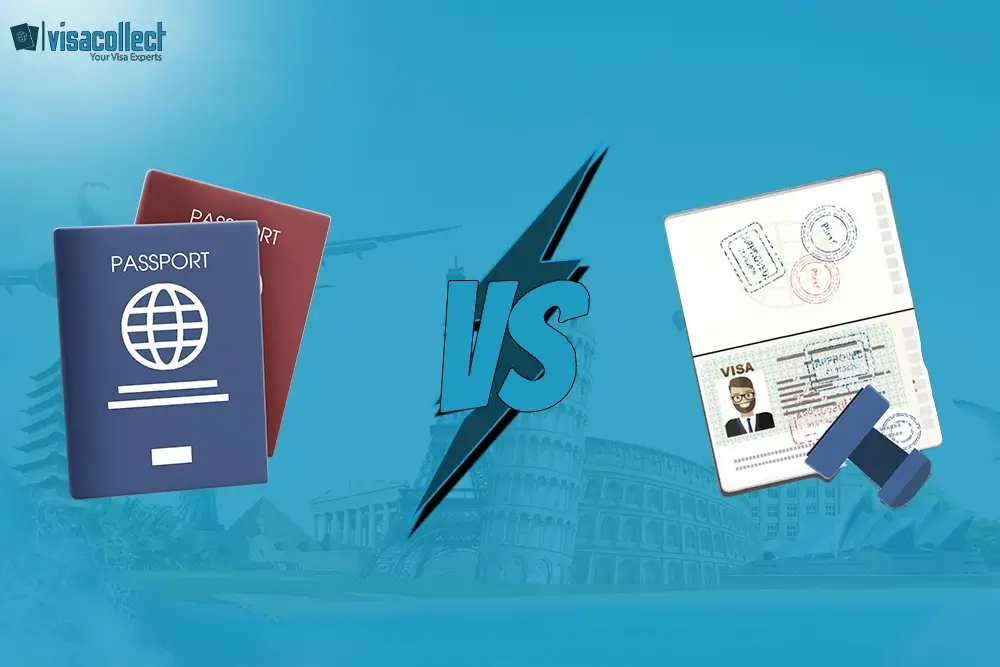
There is a lot of planning that goes into going on a foreign trip, along with a lot of excitement and anticipation. One important part of getting ready for a trip is knowing what legal documents you need to cross countries. Two important papers are at the heart of this: the passport and the visa. Even though these documents are often talked about together, they have different goals. This blog post goes into detail about the difference between visa and passport, clearing up common misunderstandings and giving travel tips to make sure everything goes smoothly.
What the Difference Is Between Visa and Passport
At its core, a passport is an official record from your country that proves who you are and where you are from, mostly for travelling between countries. It's kind of like a world ID card that has your picture, name, and other information that lets people find you. It lets you leave the country and makes you a citizen again when you come back.
On the other hand, a visa is permission from the country you want to visit. It's an add-on or stamp that you put in your passport that lets you enter, stay in, and leave the host country under certain circumstances, like for work, tourism, or school. The requirements for getting a visa are very different and rely on your nationality, the country you want to visit, and the reason for your trip.
Misconceptions People Have About Visas and Passports
People often think wrongly that just having a ticket lets you enter any country without any problems. It's not true. A passport proves who you are and where you are from, but a visa is a different requirement that each country sets to control who can enter and stay in their country.
Another myth is that visas are the same for all countries and can be used in any other country. The truth is very different. Each country has its own rules, standards, and types of visas. These are based on its immigration policies and agreements with other countries.
Another mistake that many travellers make is thinking that passports and visas are good forever. But both papers have dates when they are no longer valid. Passports need to be renewed every 5 to 10 years, but visas have different lengths of validity that depend on how long you plan to stay and why.
How to Find Your Way Around International Travel Rules
Because of these differences, it's very important for travellers to find out ahead of time what visas they will need to enter the countries they are visiting. As part of this process, you might visit official government websites, call embassies or consulates, or use the help of a professional visa service like VisaCollect. These services can help you understand the sometimes-tricky process of applying for a visa by giving you up-to-date information and making your plans easier.
Finally, getting ready to sail by having the right paperwork.
Understanding the difference between visa and passport is not just a matter of words; it's something every person travelling abroad needs to know. A passport is a form of identification that can be used anywhere, and a visa, along with the country's entry rules, is the key to getting into that country. Take the time to learn about, understand, and get the right paperwork before you plan your next trip abroad. Also, don't forget that services like VisaCollect can help you with all the details of applying for a visa , making sure that your trip goes as smoothly and enjoyably as the experiences that lie ahead.
FAQs
1. Do I always need a visa to go to a different country?
Not all the time. It depends on the place you are from and what kind of visa you need. Some countries let people from certain countries travel there without a visa or give them passes when they arrive.
2. I only have a passport. Can I still travel?
Yes, for trips within your own country. If you want to travel to another country, you need to find out if they need a visa.
3. How long should I wait to get a visa before my trip?
Because working times can change, it's best to apply a few weeks to months ahead of time.
4. What should I do if my visa application is turned down?
Depending on the rules of your country, you may be able to reapply or challenge the decision.
5. Can I have visas for more than one country in my passport at the same time?
Yes, you can have more than one legal visa in your passport.
6. How do I know if my destination country requires a visa?
Consult the country's embassy or consulate website, or use a professional visa service like VisaCollect for accurate and current information.
7. Can I extend my visa while in a foreign country?
In some cases, yes, but it depends on the country's immigration laws and the type of visa you hold.
8. Are electronic visas (e-Visas) available for all countries?
Not all countries offer e-Visas. Check the specific country's official immigration or embassy website for e-Visa availability.
9. What should I do if my passport expires while I'm abroad?
Contact your country's embassy or consulate immediately for guidance on renewing or obtaining a temporary travel document.
10. Can I travel on a passport that’s about to expire?
Many countries require your passport to be valid for at least six months beyond your date of entry. Check with your destination country before traveling.
